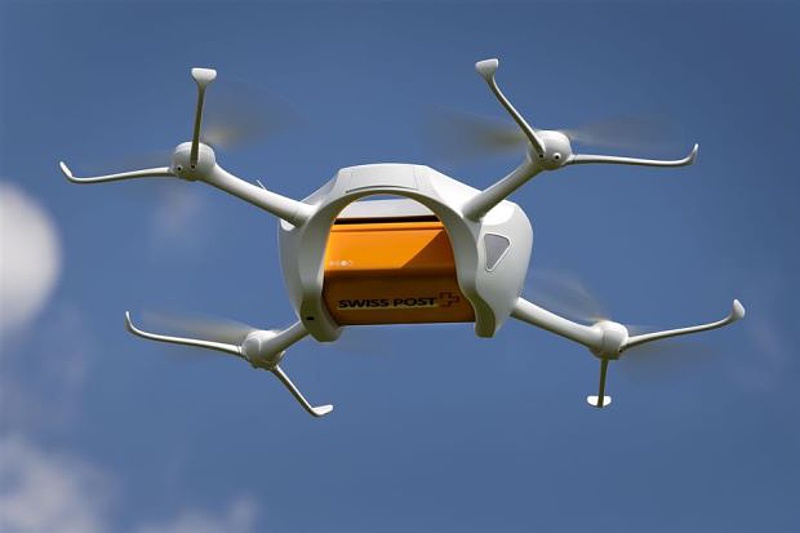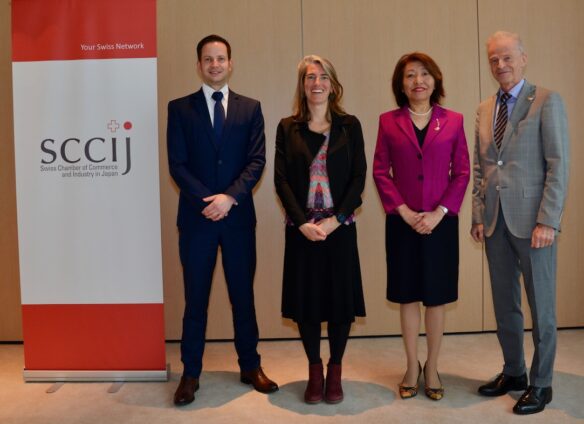Tokyo (SCCIJ) – The World Economic Forum, the international organization for public-private cooperation based in Davos, Switzerland, has created the Drone Innovators Network as a platform to bring together pioneering aviation authorities to share research, best practices and innovative new policies. The mission of the network, the first of its kind, is to inspire and accelerate the responsible use of drones across society. At the network’s inaugural event, at the Swiss Federal Institute of Technology in Zurich, Europe’s first nationwide Unmanned Traffic Management system put “digital stop signs” in the sky. Like Switzerland, Japan has also the ambition to become a leader in the use of drone technology.
Spotlighting new technology
“It is not by chance that the first international Drone Innovators Network meeting is taking place in Switzerland; Switzerland is a leader in drone technology,” said Doris Leuthard, Federal Councillor, Switzerland. “The close collaboration between institutes of technology, industry and the authorities makes Switzerland an attractive location for start-ups, companies and academic research. Switzerland is, therefore, playing a pioneering role in this area today.”

Swiss Post already uses drones
Spotlighting new technology is a key component of the new network. During the first nationwide demonstration of an Unmanned Traffic Management, for the first time in Europe, a user could track in real time, on one screen, all registered drones in flight. It is the equivalent of putting digital “stop signs” in the sky. It lowers the barrier to entry for new pilots and improves overall safety.
The system can alert registered drone users when they are about to enter a no-fly zone or when to avoid certain areas where emergency responders are working. For the first time, a system will be able to see if a drone has permission to access airspace, bringing much-needed accountability and trust to the industry. The test was carried out by the Swiss Federal Office of Civil Aviation, which worked alongside drone manufacturers Matternet, Parrot and senseFly and air-navigation service providers AirMap and Skyguide.
Patchwork of regulations
The challenges facing drones and personal aerial transport are many, and well-defined solutions that propel these technologies forward are relatively few. All over the world, a patchwork of regulations, overseen by governments more used to decade-long certification life-cycles than monthly software updates, look for data to overcome dramatic gaps in governance processes. To overcome these challenges it has never been more necessary that a community of innovators come together to drive agile policymaking.
Supported by aviation and aerospace industry leaders, the Drone Innovators Network will spotlight countries, like Rwanda and Switzerland, which have found new ways to regulate airspace alongside new technology that could advance the management of drones.
“Drones and autonomous flying vehicles, key parts of the fourth industrial revolution, provide an opportunity to revolutionize mobility networks. The Drone Innovators Network launch event at ETH Zurich brings together government, industry, academia, and civil society to co-design the principles and protocols which will maximize the benefits to society and mitigate the risks of drone technology,” said Klaus Schwab, Founder and Executive Chairman at the World Economic Forum.
“It’s all about access to airspace,” said Timothy Reuter, Head of Drones at the World Economic Forum Centre for the Fourth Industrial Revolution. “Drones are playing an increasingly important role in saving lives, promoting food security and enabling economic growth. But the kind of regulations needed to scale up this technology is not there yet. We created the Drone Innovators Network to bring together a community of government pioneers to inspire and show what is possible.”
Drone revolution in Japan
Japan is already planning and executing the use of new technologies as part of its future strategy Society 5.0. Drone delivery in Japan is more than just a novelty or a convenience. It’s useful for areas that might be hard to reach otherwise. The rural areas of the country are experiencing a decline in population numbers, as well as an ageing demographic.
In order to make sure that people who live in these remote areas can maintain their quality of life, it will be essential to increase automation in retail, social services, and agriculture through technologies such as drones.
Japan’s commitment to drone innovation comes from the top levels of its leadership. Japanese Prime Minister Shinzo Abe has frequently spoken about drones as part of the Fourth Industrial Revolution, and in 2016 his administration discussed plans around allowing drone delivery in rural areas in 2018 and in Tokyo by 2020, in time for the Olympics.
This would mean that Tokyo could become the world’s first mega city, defined as a city with over 10 million people, to allow drone delivery. Japan has met its target for starting rural drone delivery this year, with e-commerce giant Rakuten and convenience store chain Lawson teaming up to deliver food and small items via drone in Fukushima Prefecture.
Text: SCCIJ with WEF material; Photo: Swiss Post uses state-of-the-art delivery drones (© Swiss Post)





























